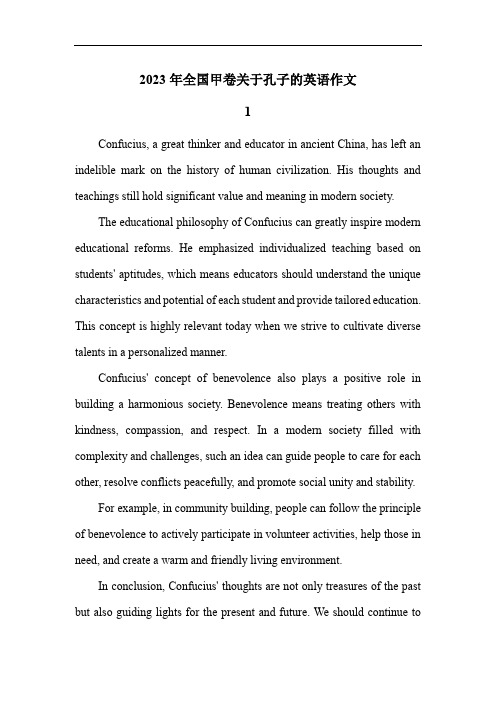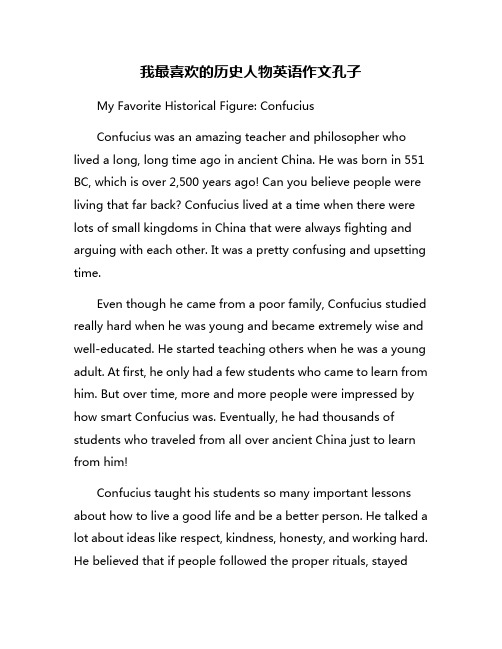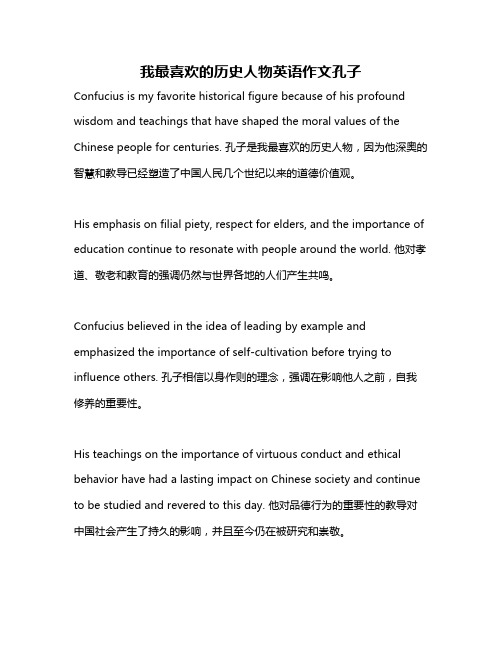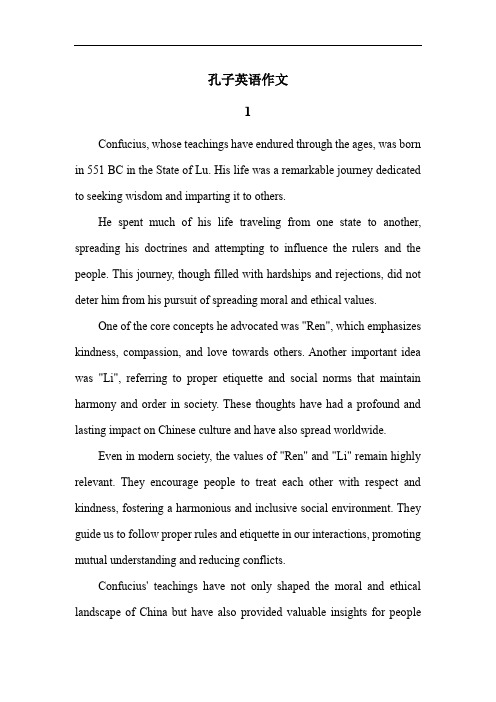中考英语作文:孔子(Confucius)
2023年全国甲卷英语作文范文孔子

2023年全国甲卷关于孔子的英语作文1Confucius, a great thinker and educator in ancient China, has left an indelible mark on the history of human civilization. His thoughts and teachings still hold significant value and meaning in modern society.The educational philosophy of Confucius can greatly inspire modern educational reforms. He emphasized individualized teaching based on students' aptitudes, which means educators should understand the unique characteristics and potential of each student and provide tailored education. This concept is highly relevant today when we strive to cultivate diverse talents in a personalized manner.Confucius' concept of benevolence also plays a positive role in building a harmonious society. Benevolence means treating others with kindness, compassion, and respect. In a modern society filled with complexity and challenges, such an idea can guide people to care for each other, resolve conflicts peacefully, and promote social unity and stability.For example, in community building, people can follow the principle of benevolence to actively participate in volunteer activities, help those in need, and create a warm and friendly living environment.In conclusion, Confucius' thoughts are not only treasures of the past but also guiding lights for the present and future. We should continue toexplore and apply them to make our society more progressive and harmonious.2Confucius, a renowned philosopher and educator in ancient China, has had a profound and far-reaching influence on global cultural exchanges. The rise of Confucius Institutes around the world is a compelling example of this. These institutions provide a platform for people from diverse cultural backgrounds to study and appreciate the teachings of Confucius, fostering mutual understanding and respect among different cultures.His wisdom is also highly relevant in resolving international conflicts. For instance, the principle of "harmony without uniformity" advocated by Confucius emphasizes the importance of finding common ground while respecting differences. This concept can guide nations to seek peaceful solutions through dialogue and compromise rather than resorting to force or aggression.Furthermore, Confucius' emphasis on moral values such as kindness, integrity, and respect for others serves as a universal code of conduct. It helps to build trust and cooperation among people of different nations, laying a solid foundation for peaceful and prosperous international relations.In conclusion, Confucius' teachings have not only endured through the ages but also continue to shine brightly in the modern world, facilitatingcross-cultural communication and contributing to global harmony and progress.3Confucius, one of the most renowned philosophers in Chinese history, has left us with profound philosophical concepts that offer invaluable insights for personal growth and development."吾日三省吾身" teaches us the significance of self-reflection. By constantly examining our actions, thoughts, and behaviors, we can identify our shortcomings and strive for improvement. For instance, when we encounter setbacks in our studies or interpersonal relationships, through self-reflection, we can analyze the reasons, learn from mistakes, and adjust our approaches accordingly.Another wisdom from Confucius, "学而不思则罔,思而不学则殆", emphasizes the balance between learning and thinking. Merely absorbing knowledge without contemplation leads to confusion, while thinking without learning is perilous. To illustrate, when studying a complex subject like mathematics, we need not only to memorize formulas but also to understand the underlying logic through thinking. Similarly, in creative endeavors such as writing, we must draw inspiration from extensive reading and then apply our thoughts to produce original works.In conclusion, Confucius' philosophical ideas provide us with a guiding light on our journey of growth. Incorporating these teachings intoour daily lives enables us to become more self-aware, efficient learners, and ultimately, well-rounded individuals capable of achieving success and fulfillment.4Confucius, a name that resonates through the corridors of Chinese history, holds an unparalleled position and has made remarkable contributions. His teachings have had a profound impact on various aspects of ancient China.In the field of education, Confucius emphasized the importance of individualized learning and the cultivation of moral character. He advocated that education should be accessible to all, regardless of their social status. This revolutionary idea laid the foundation for the development of education in ancient China and still influences educational concepts today.Politically, Confucius proposed the principles of virtuous governance and the importance of moral leadership. His belief in the righteousness of rulers and the welfare of the people provided a guiding light for political systems of that time.Ethically, Confucius' teachings on filial piety, respect for elders, and the pursuit of virtue became the moral compass of Chinese society. These values have been passed down through generations, shaping the behavior and mindset of the Chinese people.Even as time has marched on and society has evolved, the essence of Confucius' thoughts has endured and adapted. They continue to inspire and guide, proving their timeless relevance and significance. Confucius' legacy is not merely a part of history; it is a living force that shapes and enriches our present and future.5In today's complex and rapidly changing world, the wisdom of Confucius remains highly relevant and valuable. When it comes to addressing the moral dilemmas we face nowadays, we can draw inspiration from Confucius' moral principles. For instance, his emphasis on honesty, kindness, and respect for others provides clear guidance in situations where people are often torn between personal gain and ethical choices.In the pursuit of sustainable development, the concept of harmony between humans and nature advocated by Confucius holds profound significance. It reminds us that we should not exploit natural resources blindly but strive for a balance between economic progress and environmental protection. By respecting nature and adhering to the principle of moderation, we can ensure the well-being of future generations.Moreover, Confucius' teachings on education and self-cultivation are equally applicable. In a society driven by technology and rapid information flow, we need to constantly reflect on our knowledge and skills, and continuously improve ourselves to keep pace with the times.In conclusion, the wisdom of Confucius offers profound insights and practical solutions to the challenges of the contemporary society. By integrating his teachings into our lives and actions, we can create a more harmonious, just, and sustainable world.。
孔子的简介英语作文

Confucius,born in551BCE in the state of Lu,which is presentday Shandong Province,China,is one of the most influential philosophers and educators in Chinese history.His teachings,which emphasize morality,justice,and social harmony,have had a profound impact on Chinese society and culture for centuries.1.Early Life and Education:Confucius was born into a family that had fallen from nobility.Despite the humble beginnings,he was passionate about education and sought to learn from various scholars.His quest for knowledge was relentless,and he became wellversed in the rituals,music,and poetry of his time.2.Philosophical Beliefs:Confuciuss philosophy,known as Confucianism,centers around the concept of Ren仁,which can be translated as benevolence or humaneness.He believed that individuals should cultivate moral virtue and act with kindness and respect towards others.His teachings also emphasize the importance of Li礼,which refers to proper etiquette and social norms.3.Political Views:Confucius was a strong advocate for good governance and believed that rulers should lead by moral example.He criticized the corruption and moral decay of his time and sought to restore the virtues of the ancient sage kings.cational Reforms:Recognizing the importance of education in shaping society, Confucius opened a private school that was accessible to all,regardless of their social status.This was a revolutionary idea at a time when education was typically reserved for the nobility.5.The Analects:The core text of Confucianism is The Analects论语,which is a collection of sayings and ideas attributed to Confucius and his disciples.It provides insights into his teachings on ethics,politics,and education.6.Legacy and Influence:Confuciuss ideas have shaped Chinese society for over two millennia.His emphasis on moral integrity,respect for elders,and the importance of education has become deeply ingrained in Chinese culture.His teachings have also spread to other East Asian countries,influencing their social and political structures.7.Cultural Practices:Many cultural practices in China,such as filial piety,ancestor worship,and the civil service examination system,have been influenced by Confucian thought.The examination system,in particular,was designed to select officials based on their knowledge of Confucian classics.8.Modern Interpretations:In contemporary times,Confucianism continues to be relevant. It is often discussed in the context of modern governance,ethics,and social responsibility. Some argue that Confucian values can contribute to social stability and moral development in a rapidly changing world.9.Controversies:While Confucius is revered by many,his teachings have also been criticized for reinforcing a rigid social hierarchy and for being overly conservative. Despite these criticisms,his influence on Chinese thought and culture remains undeniable.10.Conclusion:Confuciuss life and teachings continue to inspire and guide millions.His emphasis on personal virtue,social harmony,and the pursuit of knowledge remains a powerful force in shaping ethical behavior and societal values.。
我最喜欢的历史人物英语作文孔子

我最喜欢的历史人物英语作文孔子My Favorite Historical Figure: ConfuciusConfucius was an amazing teacher and philosopher who lived a long, long time ago in ancient China. He was born in 551 BC, which is over 2,500 years ago! Can you believe people were living that far back? Confucius lived at a time when there were lots of small kingdoms in China that were always fighting and arguing with each other. It was a pretty confusing and upsetting time.Even though he came from a poor family, Confucius studied really hard when he was young and became extremely wise and well-educated. He started teaching others when he was a young adult. At first, he only had a few students who came to learn from him. But over time, more and more people were impressed by how smart Confucius was. Eventually, he had thousands of students who traveled from all over ancient China just to learn from him!Confucius taught his students so many important lessons about how to live a good life and be a better person. He talked a lot about ideas like respect, kindness, honesty, and working hard. He believed that if people followed the proper rituals, stayedloyal to their family, and always did the right thing, it would lead to a more peaceful society. Doesn't that sound like great advice?One of my favorite quotes from Confucius is "What you do not want done to yourself, do not do to others." That reminds me to always treat my classmates, friends, and family the way I would want to be treated - with kindness and respect. If I follow the Golden Rule like Confucius taught, I'll be a much nicer person.Confucius also spent a lot of time talking about getting a good education. He thought that studying and learning was super important, especially subjects like literature, music, history, and philosophy. I agree that it's crucial to work hard in school so you can grow up to be a knowledgeable, successful adult. I try my best to be a good student, just like Confucius' followers over 2,000 years ago!The more I learn about this fascinating philosopher, the more I look up to him. I'm in awe that Confucius came up with so many wise ideas when he lived centuries before modern times. His teachings have influenced billions of people all around the world, especially in China where he is deeply revered. Many countries still study and follow Confucianism today.Though he lived a simple life as a humble teacher, Confucius was one of the most influential thinkers in all of human history. His lessons on morality, loyalty, education, andself-improvement are just as meaningful today as when he first spoke them so long ago. That's why I most admire Confucius as my favorite historical figure - his brilliant philosophy has stood the test of time for over 2,500 years. Now that's the mark of a truly great human being.I hope that someday I can have even a fraction of the wisdom and insight that Confucius possessed. He overcame poverty and hardship through his dedication to learning and self-cultivation. If I work hard in school, treat others with respect, and always try to do the right thing like Confucius taught, then I'll be on my way to living a life of virtue and fulfillment. Confucius' words will continue inspiring me for many, many years to come.。
我最喜欢的历史人物英语作文孔子

我最喜欢的历史人物英语作文孔子Confucius is my favorite historical figure because of his profound wisdom and teachings that have shaped the moral values of the Chinese people for centuries. 孔子是我最喜欢的历史人物,因为他深奥的智慧和教导已经塑造了中国人民几个世纪以来的道德价值观。
His emphasis on filial piety, respect for elders, and the importance of education continue to resonate with people around the world. 他对孝道、敬老和教育的强调仍然与世界各地的人们产生共鸣。
Confucius believed in the idea of leading by example and emphasized the importance of self-cultivation before trying to influence others. 孔子相信以身作则的理念,强调在影响他人之前,自我修养的重要性。
His teachings on the importance of virtuous conduct and ethical behavior have had a lasting impact on Chinese society and continue to be studied and revered to this day. 他对品德行为的重要性的教导对中国社会产生了持久的影响,并且至今仍在被研究和崇敬。
One of the reasons why I admire Confucius is his emphasis on the importance of lifelong learning and self-improvement. 我钦佩孔子的原因之一,是他强调终身学习和自我提升的重要性。
有关孔子的英语作文

Confucius,a renowned philosopher and educator from ancient China,has had a profound influence on Chinese culture and society.His teachings,known as Confucianism,have shaped the moral and ethical foundations of Chinese civilization for centuries.1.Early Life and Education:Confucius was born in551BCE in the state of Lu,which is presentday Shandong Province.His family was of noble lineage,but they had fallen into poverty.Despite the hardships,Confucius was educated and developed a deep love for learning and the ancient rituals.2.Philosophy and Teachings:Confucius emphasized the importance of moral integrity, respect for elders,and the proper conduct of individuals within society.He believed in the concept of Ren benevolence or humaneness and Li ritual propriety,which are central to his philosophy.His teachings advocated for a just and harmonious society guided by virtuous leaders.3.The Analects:The most significant collection of Confuciuss sayings and ideas is found in the Analects Lunyu.This text,compiled by his disciples after his death,serves as a guide to moral and ethical conduct.It covers a wide range of topics,including governance,education,and personal development.4.Political Influence:Confuciuss ideas on governance were highly influential.He believed that a ruler should lead by example,embodying moral virtues and ensuring the welfare of the people.His political philosophy was adopted by many Chinese dynasties, which used Confucianism as the basis for their administrative systems.cational Reforms:As an educator,Confucius stressed the importance of education for all,regardless of social status.He opened a private school and taught students from various backgrounds.His emphasis on education as a means to cultivate virtue and wisdom has had a lasting impact on Chinese educational systems.6.Cultural Impact:Confuciuss teachings have deeply influenced Chinese culture, including art,literature,and social customs.His ideas on filial piety,loyalty,and respect for tradition are still prevalent in modern Chinese society.7.Legacy and Modern Interpretations:Today,Confuciuss teachings continue to be studied and debated.While some aspects of his philosophy have been criticized,others are seen as timeless wisdom that can be applied to contemporary issues.His emphasis on moral development and social harmony remains relevant in discussions about personal ethics and societal wellbeing.8.Global Recognition:Confuciuss influence extends beyond China.His philosophy has been studied and appreciated worldwide,and many educational institutions and cultural centers have been named after him.The Confucius Institutes,for example,are nonprofit public institutions aimed at promoting Chinese language and culture internationally.In conclusion,Confucius was not only a philosopher and educator but also a reformer who sought to improve society through the cultivation of virtue and the establishment of just social systems.His legacy continues to inspire and guide individuals and societies in their pursuit of moral and ethical living.。
孔子英语作文90词

孔子英语作文1Confucius, whose teachings have endured through the ages, was born in 551 BC in the State of Lu. His life was a remarkable journey dedicated to seeking wisdom and imparting it to others.He spent much of his life traveling from one state to another, spreading his doctrines and attempting to influence the rulers and the people. This journey, though filled with hardships and rejections, did not deter him from his pursuit of spreading moral and ethical values.One of the core concepts he advocated was "Ren", which emphasizes kindness, compassion, and love towards others. Another important idea was "Li", referring to proper etiquette and social norms that maintain harmony and order in society. These thoughts have had a profound and lasting impact on Chinese culture and have also spread worldwide.Even in modern society, the values of "Ren" and "Li" remain highly relevant. They encourage people to treat each other with respect and kindness, fostering a harmonious and inclusive social environment. They guide us to follow proper rules and etiquette in our interactions, promoting mutual understanding and reducing conflicts.Confucius' teachings have not only shaped the moral and ethical landscape of China but have also provided valuable insights for peoplearound the world. His wisdom continues to inspire and guide us, showing us the path to a more harmonious and civilized existence.2Confucius was one of the most influential educators in ancient China. His educational concepts and methods have had a profound impact on education throughout history and still offer valuable insights for modern education.Confucius advocated individualized teaching, which means tailoring education to the unique characteristics and abilities of each student. For instance, he recognized that different students had different learning speeds and styles, and therefore adjusted his teaching accordingly. This approach helps students to develop their potential to the fullest.Another important teaching method of Confucius was heuristic teaching. Instead of simply imparting knowledge, he encouraged students to think independently and ask questions. By guiding students to discover answers on their own, he nurtured their critical thinking skills and creativity.His idea of "education for all" has played a crucial role in promoting educational equity. It implies that everyone, regardless of their social status or background, should have the opportunity to receive education. This concept has inspired efforts to provide accessible and quality education to all in contemporary society.In today's educational context, we can draw many inspirations fromConfucius. We should pay attention to the individual differences of students and provide personalized learning plans. We should also encourage students to actively participate in the learning process and cultivate their ability to think and solve problems independently.In conclusion, Confucius' educational philosophy and methods remain highly relevant and provide a guiding light for improving and innovating education in the present era.3Confucius was one of the most influential philosophers in ancient China. His political ideas and viewpoints have had a profound impact on both ancient and modern society. Confucius advocated for the rule of virtue. He believed that a ruler should possess moral integrity and set a good example for the people. For instance, a virtuous leader would be kind, just, and honest, inspiring others to follow suit and thereby creating a harmonious society.Another important aspect of Confucius' political thought was the rule of propriety. He emphasized the significance of rituals and etiquette in maintaining social order. In ancient times, proper ceremonies and behaviors helped to define people's roles and responsibilities within the community, reducing conflicts and promoting stability.Even in modern society, these ideas still hold value. A leader who demonstrates high moral standards can gain the trust and respect of thepeople. And the emphasis on courtesy and mutual respect can help build a more civilized and harmonious social environment.In conclusion, Confucius' political ideas provide valuable insights for governance. They remind us of the importance of moral leadership and the role of proper behavior in shaping a well-ordered and prosperous society.4Confucius, one of the most renowned philosophers in Chinese history, has left behind a wealth of wisdom through his classic sayings. Take the statement "It is delightful to learn and to review from time to time." This emphasizes the significance of continuous learning and revision. It implies that true knowledge comes not only from the initial acquisition but also from the repetitive reinforcement and deepening of understanding. Such an attitude towards learning encourages us to keep seeking new knowledge and consolidating the old, fostering a spirit of never-ending exploration.Another notable saying is "When I walk along with two others, they may serve me as my teachers." This reflects a humble and open-minded approach to life. It teaches us to be observant and receptive, always ready to learn from the strengths and virtues of others, regardless of their background or status. It reminds us that there is always something we can learn and improve upon, and that arrogance and self-satisfaction are barriers to personal growth.Confucius' teachings have endured through the ages precisely becausethey offer practical and profound guidance for leading a meaningful and fulfilling life. His words encourage us to be diligent learners, constantly evolving and improving ourselves, while also fostering an attitude of respect and appreciation towards others. By internalizing these teachings, we can navigate the challenges of life with wisdom and grace.5Confucius, a great philosopher and educator in ancient China, has had a profound and lasting influence on Chinese culture and the world. His thoughts and teachings have been passed down through generations and continue to play a significant role in today's society.The spread of Confucianism is not limited to China. Confucius Institutes have been established worldwide, providing a platform for people from different countries to learn about Confucianism and Chinese culture. These institutes have attracted numerous students and enthusiasts, promoting cultural exchanges and mutual understanding.In contemporary times, scholars have delved deeper into Confucius' thoughts and made innovative developments. They have explored how Confucianism can be applied in modern social governance, moral education, and interpersonal relationships. For example, the concept of "benevolence" advocated by Confucius has been reinterpreted and adapted to address contemporary social issues such as social justice and compassion.The inheritance and development of Confucius' thoughts are crucial for cultural continuity. It helps us maintain our roots and identity while also providing valuable insights for solving modern problems. We should cherish and carry forward this precious cultural heritage, allowing it to shine with new brilliance in the context of the times.。
关于孔子的英语作文5句

Confucius: The Philosopher of HarmonyConfucius, a renowned Chinese philosopher, stands as a beacon of wisdom and morality. His teachings, centered around the Golden Rule and the importance of social harmony, have shaped the cultural and ethical landscape of East Asia for centuries. His influence extends far beyond the borders of China, making him a globally recognized figure in philosophy and ethics.Born in 551 BCE, Confucius lived during a time of political upheaval and social discord. Despite these challenges, he dedicated his life to seeking harmonythrough morality and education. He emphasized theimportance of personal and societal growth, urging individuals to strive for excellence and to treat otherswith respect and compassion.Confucius's philosophy, known as Confucianism, promotes the virtues of loyalty, filial piety, and righteousness. These virtues, he believed, are essential for maintaining social order and promoting harmonious relationships. His emphasis on education as a tool for personal and societaltransformation has led to the establishment of a rich educational tradition in East Asia.In today's world, the teachings of Confucius continue to resonate. His philosophy offers a valuable perspective on the importance of morality, respect, and harmony in our lives. As we face the challenges of a globalized world, Confucius's wisdom reminds us of the need for unity and mutual understanding among diverse cultures and beliefs.孔子:和谐之哲人孔子,这位备受推崇的中国哲学家,宛如智慧与道德的明灯,数个世纪以来一直塑造着东亚的文化和伦理风貌。
介绍孔子英文作文80词

介绍孔子英文作文80词Confucius, also known as Kong Zi, was a philosopher and educator who lived in ancient China. 孔子,又称孔夫子,是古代中国的哲学家和教育家。
He was born in the state of Lu during the Spring and Autumn Period. 他出生在春秋时期的鲁国。
Confucius is considered one of the most important figures in Chinese history, known for his teachingson morality, justice, and social relationships. 孔子被认为是中国历史上最重要的人物之一,以他关于道德、正义和社会关系的教导而著称。
His philosophy emphasized the importance of self-cultivation and ethical behavior in all aspects of life. 他的哲学强调了自我修养和道德行为在生活的各个方面的重要性。
Confucius's teachings were compiled by his disciples into a book called the Analects. 孔子的教导被他的弟子整理成一本书,名为《论语》。
This book contains his thoughts on government, education, family, and personal conduct. 这本书包含了他关于政府、教育、家庭以及个人行为的思想。
Throughout his life, Confucius traveled from state to state, offering advice to rulers and teaching his disciples. 在他的一生中,孔子周游各国,为统治者提供建议,并教导他的弟子。
